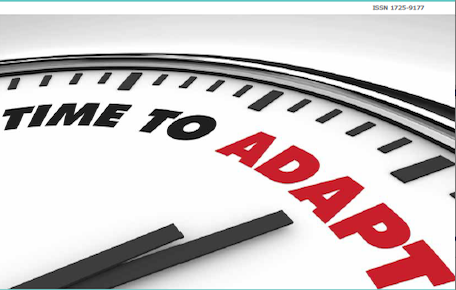
Sources: the European Environment Agency (EEA) press release; the EEA report “Adaptation in Europe”
Europe’s economy and society need to adapt to climate change, as examined in a new report from the European Environment Agency (EEA).
The “Adaptation in Europe” report, describes the policies and some of the measures taken at EU level and by European countries, aiming primarily to inform and support the work of those policymakers who are formulating adaptation policy or will be in the future.
So far half of the 32 EEA member countries have plans for adaptation, and some have started to take action, although all countries still have a lot of work to do.
The report is focused on supporting the development of EU adaptation policy across governance levels, and in particular the implementation of the EU Strategy on Adaptation to Climate Change. It will also be of relevance to national and regional authorities, and to private stakeholders involved in either planning or implementing adaptation actions. More in detail, chapter 1 frames adaptation to climate change within the context of broader socio-economic change. It also discusses how adaptation fits within other EU policy initiatives and concepts such as “Europe 2020 – Europe’s growth strategy”, the Resource Efficiency flagship initiative, and sustainable development. It argues that adaptation both presents a challenge to European society, and provides opportunities to build resilience within human and natural systems.
Chapter 2 provides a series of examples that illustrate adaptation in practice in Europe. It presents the levers (policy tools used at EU level to assist the implementation of adaptation measures), and offers a basis for learning from experiences about the factors that contribute to successful adaptation action, and the possible obstacles that can hinder it. Chapter 3 reviews the European policy context within which adaptation is being strategically planned, supported and implemented, while chapter 4 addresses key issues that will shape the future of adaptation in Europe.
While global mitigation efforts should continue to aim to limit global temperature increases to 2 °C, the report states that it is necessary to prepare for a greater range of temperature increases and other climate changes. This is needed to properly account for the many uncertainties in climatic and socio-economic projections.
A previous EEA report has shown that climate change is already affecting all regions in Europe, causing a wide range of impacts on society and the environment. Further impacts are expected in the future if no action is taken. Observations show higher average temperatures across Europe. Precipitation is decreasing in southern regions and increasing in northern Europe.
Jacqueline McGlade, EEA Executive Director, said: “Adaptation is about new ways of thinking and dealing with risks and hazards, uncertainty and complexity. It will require Europeans to cooperate, to learn from each other and to invest in the long-term transformations needed to sustain our well-being in the face of climate change.”
Europe begins to adapt
The report recommends a combination of different measures – “grey” measures such as technological and engineering projects, “green” ecosystem-based approaches using nature, and so-called “soft” measures such as policies to change governance approaches. The most effective adaptation projects often combine two or more different approaches, the report says.
For example, adaptation on France’s Mediterranean coast uses an integrated approach considering climate change, tourism, transport and biodiversity. In urban areas green spaces and water bodies work together with building design to reduce heatwave risks. Barcelona has also started to adapt to water shortages with a new highly efficient desalination plant. This “grey” project works in tandem with other ‘soft’ initiatives such as incentives to reduce water consumption, reducing the impacts from prolonged droughts.
While the cost of adaptation may be high in some cases, the report emphasises the overall savings from some adaptation actions. One of the largest ecosystem-based adaptation projects is restoring the Danube river basin to its previously natural state. Although it will cost an estimated € 183 million, it should help prevent flooding such as the 2005 event which alone cost € 396 million in damages.
Early warning systems to help predict forest fires, floods and droughts have been set up in Europe. Such soft measures can help communities cope with risks, the report says. A similar project in Italy has set up early warning systems for mosquito-borne diseases expected to increase with climate change.
Future challenges
Europe needs to adapt to climate change in a coherent way, ensuring adaptation is integrated in EU and national policies, the report says. There is no ‘one-size-fits-all’ approach – adapting to climate change should respond to national and local conditions.
There is still uncertainty in climate change projections, and it is difficult to accurately estimate future risks as socio-economic aspects are also changing. For these reasons adaptation planning should be flexible enough to cope with unforeseen circumstances and a range of future climate changes, the report says. For example, the upgrade of the Thames Barrier which protects London from coastal flooding is being planned to keep options open, so it can be adjusted depending on the trend in sea level rise.
Climate-ADAPT has a wealth of case studies and other information to help countries, regions and cities adapt to climate change. The website includes information on projected climate impacts and national actions as well as news and upcoming events.
The EEA report “Adaptation in Europe” has been prepared by experts from a range of organizatins including experts from the European Topic Centre on Climate Change impacts, vulnerability and adaptation (ETC/CCA). The ETC CCA is a Centre of thematic expertise working for the European Environment Agency (EEA) carrying out specific tasks in the area of climate change impacts, vulnerability and adaptation across Europe. The ETC/CCA consortium comprises 14 European institutes led by the CMCC (Centro Euro-Mediterraneo sui Cambiamenti Climatici).
Sergio Castellari (ETC/CCA, CMCC – SERC Division) is among the experts who reviewed the report.
Download the integral version of report.


